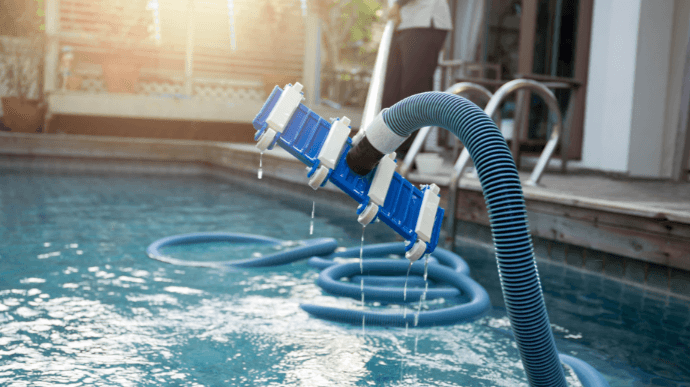How to Maintain Your Pool for Year-Round Use

Introduction
Owning a pool is a luxury that offers endless enjoyment and relaxation, but it also comes with the responsibility of regular maintenance, especially if you plan to use it year-round. Whether you’re basking in the summer sun or taking a dip during the cooler months, maintaining your pool ensures it’s always in top condition, ready for use whenever you are. Proper year-round maintenance not only keeps your pool clean and safe but also extends its lifespan, protects your investment, and saves you money in the long run. In this guide, we’ll explore the essential steps to keep your pool pristine and functional throughout the year.
Understanding the Basics of Pool Maintenance
Before diving into specific seasonal maintenance tasks, it’s crucial to understand the fundamentals of pool care. Maintaining a pool involves balancing water chemistry, ensuring proper filtration, and routinely cleaning the pool’s surfaces and equipment. These tasks are essential regardless of the season, but their frequency and intensity may vary based on weather conditions and usage patterns.
Water Chemistry
The cornerstone of pool maintenance is balanced water chemistry. Properly balanced water prevents algae growth, protects the pool’s surfaces, and ensures swimmer safety. The key components to monitor include pH levels, alkalinity, calcium hardness, and chlorine levels. Regularly testing and adjusting these elements is crucial to prevent issues like cloudy water, scaling, or corrosion.
Filtration System
Your pool’s filtration system is its lifeblood, circulating water to remove debris, dirt, and other contaminants. Ensure your filter is running efficiently by cleaning or replacing it as needed. Depending on the type of filter (sand, cartridge, or diatomaceous earth), maintenance tasks will vary, but all filters require regular attention to keep your pool water crystal clear.
Cleaning and Debris Removal
Even with a well-functioning filtration system, regular cleaning is necessary to remove debris, algae, and other unwanted materials from your pool. This includes skimming the surface for leaves, vacuuming the pool floor, and brushing the walls and tiles to prevent buildup. Regular cleaning not only improves the pool’s appearance but also prevents long-term damage.
Seasonal Pool Maintenance: Adjusting to Weather Changes
Maintaining your pool year-round requires adjustments based on the season. Different weather conditions demand specific care routines to ensure your pool remains in optimal condition.
Spring Pool Maintenance
As temperatures begin to rise, it’s time to prepare your pool for increased use. Spring is the perfect time to deep clean your pool and ensure all systems are functioning properly.
- Inspect Pool Equipment: Check pumps, filters, heaters, and other equipment for any signs of wear or damage. Replace or repair as needed to ensure they’re ready for the swimming season.
- Shock the Pool: After a long winter, your pool may need a shock treatment to eliminate any contaminants that have built up. Shocking involves adding a large dose of chlorine to kill bacteria and algae.
- Balance Water Chemistry: Test and adjust the water chemistry, focusing on pH, alkalinity, and chlorine levels. This sets the foundation for maintaining balanced water throughout the season.
- Clean the Pool Thoroughly: This includes scrubbing the walls, floors, and tiles, vacuuming, and skimming off any debris. Consider using a robotic pool cleaner for an efficient clean.
Summer Pool Maintenance
During the peak swimming season, your pool will require more frequent maintenance to handle the increased usage and higher temperatures.
- Daily Skimming and Cleaning: Skim the pool daily to remove leaves and debris. Brush the walls and vacuum the pool weekly to prevent algae growth.
- Monitor Water Levels: Evaporation rates are higher during the summer, so regularly check and adjust the water level. The water should be at the midpoint of your pool skimmer.
- Maintain Water Chemistry: Test the water at least twice a week and adjust the chemical levels as necessary. Pay special attention to chlorine levels, as they can be depleted quickly with frequent use and high temperatures.
- Backwash the Filter: Depending on your filter type, backwashing (reversing the flow of water through the filter) helps remove trapped debris. Do this every few weeks or as needed to maintain efficiency.
Fall Pool Maintenance
As temperatures cool, it’s important to prepare your pool for less frequent use while still keeping it ready for the occasional swim.
- Clean Thoroughly After Each Use: With leaves and other debris falling, you’ll need to be diligent about cleaning. Skim, vacuum, and brush the pool regularly.
- Adjust Water Chemistry: As usage decreases, chemical levels may stabilize, but it’s still crucial to monitor and adjust as necessary. Pay attention to the pH and chlorine levels to avoid algae growth.
- Cover the Pool: If you plan on using the pool less frequently, consider investing in a high-quality pool cover to protect it from debris and reduce evaporation.
- Service the Heater: If you’re using a pool heater during the cooler months, have it serviced to ensure it’s operating efficiently.
Winter Pool Maintenance
For those living in milder climates where pools remain open in winter, special care is required to keep the pool in good condition.
- Run the Pump: Running the pool pump for a few hours each day helps prevent the water from freezing and keeps the system functioning properly.
- Check and Maintain Water Chemistry: Even though the pool may not be in regular use, it’s still important to test and adjust the chemical levels to prevent algae growth and scaling.
- Use a Pool Cover: A pool cover is essential during the winter to keep out debris and reduce the amount of maintenance required.
- Consider Installing a Freeze Protector: In areas where temperatures occasionally dip below freezing, a freeze protector can automatically turn on the pump and heater to prevent ice damage.
Year-Round Pool Maintenance Tips
Maintaining a pool year-round requires consistency and attention to detail. Here are some additional tips to keep your pool in top shape throughout the year.
Regular Inspections
Perform regular inspections of your pool and its equipment. Look for signs of wear, leaks, or damage and address them promptly. Early detection of problems can save you from costly repairs and downtime.
Stay on Top of Cleaning
Regular cleaning is key to preventing algae, staining, and debris buildup. Even in seasons where the pool is used less frequently, maintaining a cleaning routine ensures your pool is always ready for a swim.
Energy Efficiency
Consider upgrading to energy-efficient equipment, such as variable-speed pumps or solar heaters, to reduce operating costs. Efficient equipment not only saves money but also helps extend the life of your pool.
Professional Help
If maintaining your pool becomes overwhelming, consider hiring a professional pool service. Regular professional inspections and maintenance can help catch issues early and ensure your pool is being cared for properly.
Common Pool Maintenance Challenges and How to Overcome Them
Maintaining a pool year-round isn’t without its challenges. Here’s how to address some common issues that pool owners face.
Algae Growth
Algae can be a persistent problem, especially in warmer climates. Regularly brushing the pool surfaces, maintaining proper chlorine levels, and shocking the pool as needed can prevent algae blooms.
Cloudy Water
Cloudy water can result from imbalanced chemicals, poor filtration, or environmental contaminants. Regular testing and adjustments to water chemistry, combined with proper filtration, can keep your water clear.
Stains on Pool Surfaces
Stains can develop from metals, organic matter, or algae. Identifying the cause of the stain is the first step to treating it. Regular cleaning and maintaining balanced water chemistry can prevent stains from forming.
Equipment Malfunctions
Pool equipment can wear out or malfunction over time. Regular inspections and maintenance, along with prompt repairs, can keep your equipment in good working order.
Benefits of Year-Round Pool Maintenance
Investing time and effort into maintaining your pool year-round offers numerous benefits beyond just having a clean pool.
Extended Pool Lifespan
Regular maintenance helps prevent damage to your pool’s surfaces and equipment, extending its overall lifespan. This means fewer repairs and replacements over the years, saving you money.
Consistent Swimming Experience
By keeping your pool in top condition, you can enjoy a consistent swimming experience throughout the year. No need to worry about cloudy water, algae, or malfunctioning equipment disrupting your plans.
Increased Property Value
A well-maintained pool can enhance the value of your property. If you ever decide to sell your home, a pristine pool can be a major selling point for potential buyers.
Frequently Asked Questions
How often should I test my pool water?
Test your pool water at least once a week during the off-season and 2-3 times a week during the peak swimming season. Regular testing ensures that you can make timely adjustments to maintain balanced water chemistry.
Is it necessary to run the pool pump every day?
Yes, running the pool pump every day is essential for proper circulation and filtration. The exact number of hours depends on the size of your pool and the pump’s capacity, but generally, 8-12 hours daily is recommended.
What is the best way to prevent algae growth in my pool?
Maintain proper chlorine levels, regularly brush the pool surfaces, and ensure your filtration system is working efficiently. Using algaecide as a preventative measure can also help keep algae at bay.
How can I reduce my pool’s energy costs?
Consider upgrading to energy-efficient equipment, such as variable-speed pumps and LED lighting. Additionally, using a pool cover can reduce heat loss and water evaporation, further saving on energy costs.
Do I need to winterize my pool if I live in a warm climate?
Even in warm climates, it’s important to adjust your pool maintenance routine for winter. This may include reducing the frequency of cleaning and chemical adjustments while still maintaining essential systems like filtration.
What should I do if my pool water becomes cloudy?
Cloudy water can result from imbalanced chemicals or poor filtration. Start by testing and adjusting the water chemistry, especially chlorine and pH levels. Ensure your filtration system is working properly, and consider using a clarifier to help clear the water.
Conclusion
Maintaining your pool for year-round use requires consistent effort, but the rewards are well worth it. By following the guidelines and tips outlined in this article, you can enjoy a clean, safe, and inviting pool no matter the season. Regular maintenance not only enhances your swimming experience but also protects your investment and adds value to your property. So, dive in with confidence, knowing your pool is ready for you all year long.






